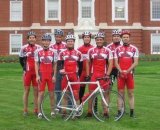Last week in Collegiate Chronicles, you met Rutgers University Cycling Team’s Director Mark Vareschi, and read about some of his fond memories of the team and its evolution over the years. Today, Vareschi offers some wisdom for other collegiate teams about building a cyclocross team in your collegiate conference.
Mark “Mama Bear” Vareschi has been an integral part in transforming the team into the cyclocross powerhouse that it is today, with sponsors ranging from Efinger Sporting Goods, a local bike and sporting good shop, all the way to Raleigh USA, who provided the team with full ’cross bikes in the 2010 season. The team boasts a five-year-long winning streak in the Eastern Collegiate Cycling Conference for Cyclocross, and nearly all of the racers on the team have been on the overall season podium for their respective categories.
Cyclocross Magazine: Do you see a big difference between collegiate and regular cyclocross?
Mark Vareschi: At this point, there isn’t much of a difference between collegiate cyclocross and cyclocross in general. We’ve been lucky to piggyback the ECCC collegiate series on to established races in the MAC and Verge NECCS series, so the Northeast cyclocross scene is also the collegiate ’cross scene.
CXM: Have you seen the a chance in the sport since you started racing? Has that effected the collegiate ’cross scene?
MV: I’ve been racing cyclocross for almost a decade, and the discipline has changed in a lot of ways, mostly for the better. However, I’ve noticed a shift in attitude and vibe at a lot of the UCI and USAC races. It’s like when the jocks discovered hardcore shows in high school. The vibe just changed. In the subculture within a subculture that is collegiate cyclocross, I think there is more of a DIY or “we’re all in this together to figure it out” kind of attitude that persists. I love that. That’s why I came to cyclocross and immediately fell in love with it. My sense is that collegiate ’cross racers don’t take themselves all that seriously even as they are serious, competitive athletes.
CXM: Do you see the discipline of cyclocross growing collegiately?
MV: The sport is absolutely growing in collegiate ranks. We’ve seen steady growth in the ECCC cyclocross series over the past 5 years. The barriers to entry into the sport are lower than other cycling disciplines, so I think will continue to see more collegiate teams embracing cyclocross and supporting their riders who want to race cyclocross.
CXM: Do you see any other collegiate teams that are “doing it right”?
MV: I’m never sure what “doing it right” means with cyclocross. I think we tend to romanticize irreverence and the hardman/hardwoman aspect in cyclocross. So, oftentimes by “doing it right” we mean who is the wackiest or toughest. For me, “doing it right” in collegiate ’cross means bringing people out, supporting new riders, and understanding and respecting the culture and history of cyclocross.
Teams that are reflective and “know what they don’t know” to me are the ones that are doing it right.
CXM: Favorite non-Rutgers team?
MV: I love small teams from small schools who bring out their riders week to week. Bard College a bunch of years ago was like that.
CXM: Rutgers has done amazing things in terms of getting sponsored for collegiate cyclocross. How can other schools emulate Rutgers Cycling’s approach to winning sponsors?
MV: As far as how schools can grow their sponsorship, my advice would be: write well. Be very clear about who your team is and what your mission is. Also be very clear that you understand your sponsors’ needs and what you can offer them. Be good people. Sponsors, especially industry sponsors, want to support teams that are ambassadors for the sport and for their brand.
CXM: What advice do you have for schools starting/building a cycling team?
MV: Building a team from scratch can be tough at times. In addition to the general problem of building momentum on a cycling team, you have the added complexity of college and university rules and regulations about travel, competition, trademark use, etc.
Make friends with whoever directs the club sports program at your school. This person ultimately determines whether your cycling team lives or dies. Know what will be required of your club and meet or exceed those requirements. Make friends with the licensing office.
Colleges and universities have wildly varying rules governing who can use their logos and how. You never want to order cycling clothing only to find out that you cannot use your school’s trademarked logo.
CXM: Any advice on simply building a more cohesive team?
MV: I’d suggest planning reoccurring team rides, social events, and other stuff to build esprit de corps. Collegiate cycling teams are generally blessed because everyone lives nearby and has flexible schedules. Make the most of it and hang out together.
Reach out to the large cycling community. At Rutgers much of our success has been because we have an amazing community of cyclists who aren’t necessarily associated with the University. If there is a cycling club nearby, ride with them, make friends, pool resources.
Those clubs have been around before your team existed and will be there after you graduate. Draw on their knowledge and experience. Respect that knowledge and experience.
CXM: Best advice you can give new racers?
MV: For new racers: Listen. Learn from people. Actual people with whom you interact face-to-face. The internet has been a boon to the growth of cyclocross, but it has also made everyone believe they are an expert on cyclocross. The fact is that we are all in this together continually figuring it out. Some folks have been working to figure it out longer. Listen to them and draw from their experience.
Beyond the heavy-handed dictum, have fun with it. Cyclocross is fun.
Whether you are new to bike racing entirely or an experience road or mountain bike racer, it’s going to be hard, but it will also the most fun you have ever had on a bike. Seek out a skills clinic and a weekly cyclocross practice. You’ll have the opportunity to learn from others and get some experience before race day.






























